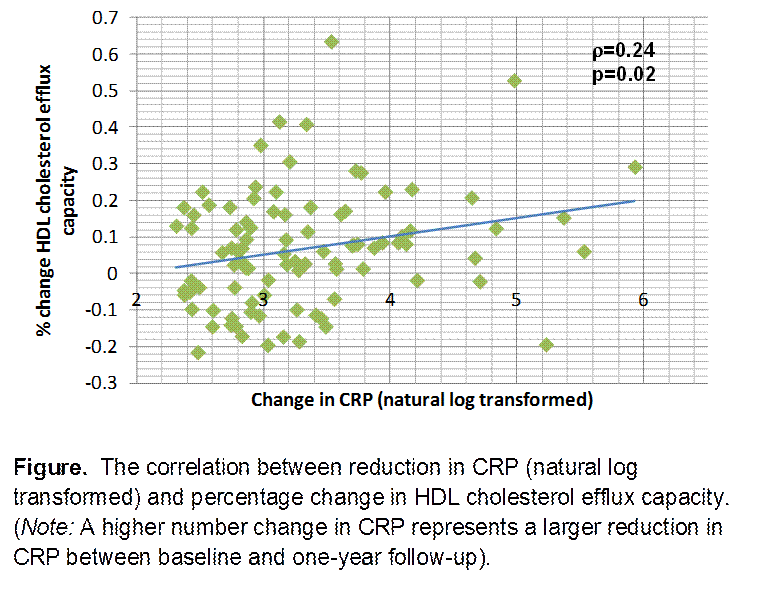Session Information
Session Type: Abstract Submissions (ACR)
Background/Purpose:
High density lipoprotein (HDL) cholesterol efflux capacity measures the functional ability of HDL to remove cholesterol from atherosclerotic plaque. Low HDL efflux capacity is associated with an elevated risk of cardiovascular disease (CVD) independent of HDL levels and traditional CV risk factors in the general population. Recent cross-sectional studies suggest that inflammation is associated with impaired HDL efflux capacity. The objective of this study was to examine whether longitudinal changes in inflammation are associated with a change in HDL efflux capacity in rheumatoid arthritis (RA).
Methods:
We conducted this study in a single center longitudinal RA cohort from a large academic center with RA clinical data, CRP and blood samples collected annually. We randomly selected 100 patients who experienced a reduction in inflammation defined as >10mg/L CRP decrease between any two time points one year apart. The first time point was defined as the baseline. Subjects on statin therapy one year before baseline or during the one-year follow-up period were excluded. We measured HDL efflux capacity in serum samples at baseline and one year follow-up quantified using a validated ex vivo system involving the incubation of macrophages with apolipoprotein B-depleted serum. We used the paired t-test to determine significant differences between baseline and follow-up HDL cholesterol efflux values. We assessed the correlation between the change in CRP levels [natural log (baseline CRP- 1 year follow-up CRP)] with percentage (%) change in HDL cholesterol efflux capacity using a Spearman’s correlation.
Results:
We studied 92 subjects who experienced a reduction in inflammation as measured by CRP between baseline and one year follow-up with adequate serum volume. The mean age was 57.7 (SD 12.3), 89.3% were female, 78.5% were ACPA positive. The mean baseline CRP was 48.4mg/L (SD 59.3), and HDL efflux capacity was 1.04 (SD 0.17). At one year follow-up, the mean reduction in CRP was 41.0mg/L (SD 54.6). We observed an increase in HDL cholesterol efflux capacity of 6.7% (p<0.0001). A reduction in CRP was significantly correlated with an increase in HDL cholesterol efflux capacity (r=0.24, p=0.02) (Figure).
Conclusion:
Although HDL cholesterol efflux capacity is considered to be a stable measure of HDL function over time in the general population, in RA subjects we observed a concomitant improvement in HDL function by efflux capacity with reductions in inflammation. These findings highlight a potential mechanism linking inflammation and CV risk in RA.
Disclosure:
K. P. Liao,
None;
M. Playford,
None;
M. A. Frits,
None;
C. K. Iannaccone,
None;
J. S. Coblyn,
CVS caremark,
5;
M. E. Weinblatt,
Antares,
5;
N. A. Shadick,
None;
N. N. Mehta,
None.
« Back to 2014 ACR/ARHP Annual Meeting
ACR Meeting Abstracts - https://acrabstracts.org/abstract/the-association-between-changes-in-inflammation-and-high-density-lipoprotein-cholesterol-efflux-capacity-in-rheumatoid-arthritis/

